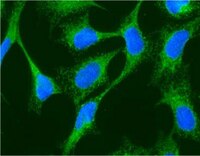Overexpression of GRP94 in breast cancer cells resistant to oxidative stress promotes high levels of cancer cell proliferation and migration: implications for tumor recurrence.
Dejeans, Nicolas, et al.
Free Radic. Biol. Med., 52: 993-1002 (2012)
2012
显示摘要
Targeting the altered redox status of cancer cells is emerging as an interesting approach to potentiate chemotherapy. However, to maximize the effectiveness of this strategy and define the correct chemotherapeutic associations, it is important to understand the biological consequences of chronically exposing cancer cells to reactive oxygen species (ROS). Using an H(2)O(2)-generating system, we selected a ROS-resistant MCF-7 breast cancer cell line, namely Resox cells. By exploring different survival pathways that are usually induced during oxidative stress, we identified a constitutive overexpression of the endoplasmic reticulum chaperone, GRP94, in these cells, whereas levels of its cytoplasmic homolog HSP90, or GRP78, were not modified. This overexpression was not mediated by constitutive unfolded protein response (UPR) activation. The increase in GRP94 is tightly linked to an increase in cell proliferation and migration capacities, as shown by GRP94-silencing experiments. Interestingly, we also observed that GRP94 silencing inhibits migration and proliferation of the highly aggressive MDA-MB-231 cells. By immunohistochemistry, we showed that GRP94 expression was higher in recurrent human breast cancers than in their paired primary neoplasias. Similar to the situation in the Resox cells, this increase was not associated with an increase in UPR activation in recurrent tumors. In conclusion, this study suggests that GRP94 overexpression may be a hallmark of aggressiveness and recurrence in breast cancers. | 22245095
 |










